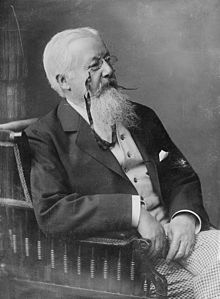Albert Traeger



Christian Gottfried Albert Traeger (* 12. June 1830 in Augsburg ; † 26. March 1912 in Charlottenburg ) was Privy Councilor and from 1874 until his death nearly four decades as a member of the governing bourgeois - left-liberal parties parliamentarians in the German Empire , which also worked as a writer and journalist.
Life
Traeger was born as the son of an editor in Augsburg . The family moved to Naumburg in 1838 , where the father initially headed a commercial business, but died in 1844. After graduating from the Domgymnasium , Traeger studied law and political science in Halle and Leipzig from 1848 to 1851 . In 1862 he became a lawyer and notary in Kölleda . In 1867 Traeger married the 26-year-old Caroline Ritter from Magdeburg . With her he fathered three children, of whom the couple lost a son in 1872. His wife died in 1873 at the age of 32. After her death Albert Traeger moved with the two remaining daughters to Nordhausen on November 10, 1875 , and in 1891 to Berlin. In 1896 he received the title of Counselor and in 1908 that of a Privy Councilor of Justice .
Traeger was 1874-1878 and 1881-1887 in the constituency Grünberg - Freystadt in Lower Silesia and 1890-1912 in the Oldenburg constituency II ( Ammerland , Wesermarsch , Friesland ) for the German Progressive Party , the German Liberal Party , the Liberal People's Party and finally for the Progressive People's Party Member of the German Reichstag . On February 7, 1912, as senior president , he chaired the opening session of the 13th German Reichstag .
Traeger was friends with Eugen Richter and connected by his convictions and was in correspondence with Ludwig Windthorst . Traeger also emerged as a writer and journalist. Among other things, he wrote poems and novels for the magazines Die Gartenlaube and the Berliner Tageblatt . In 1870, like Emanuel Geibel , he represented a German national war poetry. As editor of the yearbook German Art in Pictures and Songs from 1865 to 1886, he adapted to the taste of the Wilhelminian era .
His poems, first published in Leipzig in 1858, reached their 18th edition in 1911. His market-leading anthologies Voices of Love (1861), German Songs in Volkes Herz und Mund (1864) and Songs, Ballads, Romances, harmoniously combined with the visual arts (1871) , were created in Kölleda . His poetry has been criticized by Arno Holz . His short stories and social sketches went rather unnoticed.
Traeger was buried in the Trinity Cemetery II in Berlin-Kreuzberg .
Honors
The Traegerstrasse in the Berlin district of Schöneberg and the Albert-Traeger-Strasse in Kölleda and Nordhausen were named after him.
Works (selection)
- Poems . Keil, Leipzig 1858 (19th edition Union, Stuttgart 1909)
- Transitions . CF Winter, Leipzig and Heidelberg 1860
- German art in pictures and songs. Original contributions by German painters, poets and musicians . Klinkhardt Verlag, Leipzig, Berlin, Vienna 1865–1884
- 1870. Six poems of time . Lipperheide, Berlin 1870
- Poems . Publisher of Ernst Keil's successor. 17th increased edition 1892
- Greetings to the Berliner Tageblatt . In: Twenty-five Years of Contemporary German History - 1872–1897. Anniversary font . Ed. by the editorial staff of the Berliner Tageblatt , Rudolf Mosse , Berlin 1897, p. 195
literature
- Biography Traeger, Albert, S. 1. Digital Library Volume 9: Killy Literature Lexicon online
- Werner Vahlenkamp: Traeger, Albert. In: Hans Friedl u. a. (Ed.): Biographical manual for the history of the state of Oldenburg . Edited on behalf of the Oldenburg landscape. Isensee, Oldenburg 1992, ISBN 3-89442-135-5 , p. 757 ( online ).
Web links
- Literature by and about Albert Traeger in the catalog of the German National Library
- Albert Traeger in the database of members of the Reichstag
- Books in the Berlin State Library
- Traeger, Christian Gottfried Albert. Hessian biography. (As of March 24, 2020). In: Landesgeschichtliches Informationssystem Hessen (LAGIS).
swell
- Thuringian General , Erfurt edition, March 26, 2012
Individual evidence
- ^ Nordwest Zeitung , edition of February 13, 1982, supplement: Oldenburger Nachrichten .
| personal data | |
|---|---|
| SURNAME | Traeger, Albert |
| ALTERNATIVE NAMES | Traeger, Christian Gottfried Albert (full name) |
| BRIEF DESCRIPTION | German secret judicial council and politician (DFP, FVP, FVp), MdR |
| DATE OF BIRTH | June 12, 1830 |
| PLACE OF BIRTH | augsburg |
| DATE OF DEATH | March 26, 1912 |
| Place of death | Charlottenburg |


